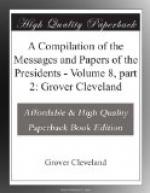of the Army; to provide and sustain a school of military
science; to extend equal protection to all the great
interests of the nation; to promote the civilization
of the Indian tribes, and to proceed in the great
system of internal improvements within the limits of
the constitutional power of the Union. Under
the pledge of these promises, made by that eminent
citizen at the time of his first induction to this
office, in his career of eight years the internal taxes
have been repealed; sixty millions of the public debt
have been discharged; provision has been made for
the comfort and relief of the aged and indigent among
the surviving warriors of the Revolution; the regular
armed force has been reduced and its constitution revised
and perfected; the accountability for the expenditure
of public moneys has been made more effective; the
Floridas have been peaceably acquired, and our boundary
has been extended to the Pacific Ocean; the independence
of the southern nations of this hemisphere has been
recognized, and recommended by example and by counsel
to the potentates of Europe; progress has been made
in the defense of the country by fortifications and
the increase of the Navy, toward the effectual suppression
of the African traffic in slaves, in alluring the
aboriginal hunters of our land to the cultivation
of the soil and of the mind, in exploring the interior
regions of the Union, and in preparing by scientific
researches and surveys for the further application
of our national resources to the internal improvement
of our country.
In this brief outline of the promise and performance
of my immediate predecessor the line of duty for his
successor is clearly delineated. To pursue to
their consummation those purposes of improvement in
our common condition instituted or recommended by
him will embrace the whole sphere of my obligations.
To the topic of internal improvement, emphatically
urged by him at his inauguration, I recur with peculiar
satisfaction. It is that from which I am convinced
that the unborn millions of our posterity who are
in future ages to people this continent will derive
their most fervent gratitude to the founders of the
Union; that in which the beneficent action of its
Government will be most deeply felt and acknowledged.
The magnificence and splendor of their public works
are among the imperishable glories of the ancient
republics. The roads and aqueducts of Rome have
been the admiration of all after ages, and have survived
thousands of years after all her conquests have been
swallowed up in despotism or become the spoil of barbarians.
Some diversity of opinion has prevailed with regard
to the powers of Congress for legislation upon objects
of this nature. The most respectful deference
is due to doubts originating in pure patriotism and
sustained by venerated authority. But nearly
twenty years have passed since the construction of
the first national road was commenced. The authority
for its construction was then unquestioned. To




